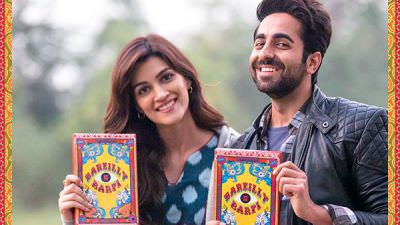

Add to it, such storytelling circumvents any predictability from seeping into the plot and invites the constant contemplation of what would happen next. The chapters are beautifully interwoven with each other and such layered story-structure brings in a connect-the-dots gratifying feel with it. Not only does the narrative keep changing tracks between three different time periods, it also keeps oscillating through smaller subplots in each timeline. The simple story is also largely augmented by Basu's non-linear storytelling pattern. What adds individuality to this episode is the fact that while Barfi is sane, he can't express wholly and while Jhilmil can express she is not completely stable. The subsequent bonding between Barfi and the autistic Jhilmil faintly reminds of Kamal Haasan-Sridevi's masterpiece Sadma. in the scene where Shruti's mother (resourcefully played by Roopa Ganguly) puts across the dilemma to her daughter with her similar love story in the past. Rather then resorting to melodrama, Basu shows restrain esp.

But not for a moment does the track seem clichéd. The love story between Barfi and Shruti is confined within the age old rich-girl-poor-boy syndrome. However it's Anurag Basu's delicate handling of the narrative that takes the film to an altogether different level.

If you analyze the film technically, it doesn't rely on a very inventive storyline. In fact his natural joie de vivre attitude, notwithstanding the deficit, imparts distinctiveness to his blithe biopic. Rather Barfi comes across as a perfectly normal guy and exudes more life than any all-right mortal. The idea is never to seek sympathy towards the protagonist. To start with, Barfi is not a film about the trials and tribulations of a deaf and mute human in this supposed normal world. Fondly called Barfi (Ranbir Kapoor), the film traces his journey as he grows up in the quaint hill-station of Darjeeling, falls in love with a tourist Shruti (Ileana DCruz), is left heartbroken and then forms another tender bond with his childhood friend, an autistic girl Jhilmil (Priyanka Chopra). The protagonist derives its name from the popular radio brand of 70s - Murphy, but ironically can't speak or hear. Such is the uniqueness of the film that it starts with the protagonist on deathbed, goes in flashback mode and despite the imminent tragic tone, still ends on a happy note. The actor oozes of such continual charm that you can't help but fall in love with him. Without a single line to mouth, Ranbir Kapoor expresses much more than any average actor could even dream of. Barfi has the potential to make the stonehearted go soggy-eyed with its sheer sensitivity and the capability to make even cynics open up to its warmth.


 0 kommentar(er)
0 kommentar(er)
